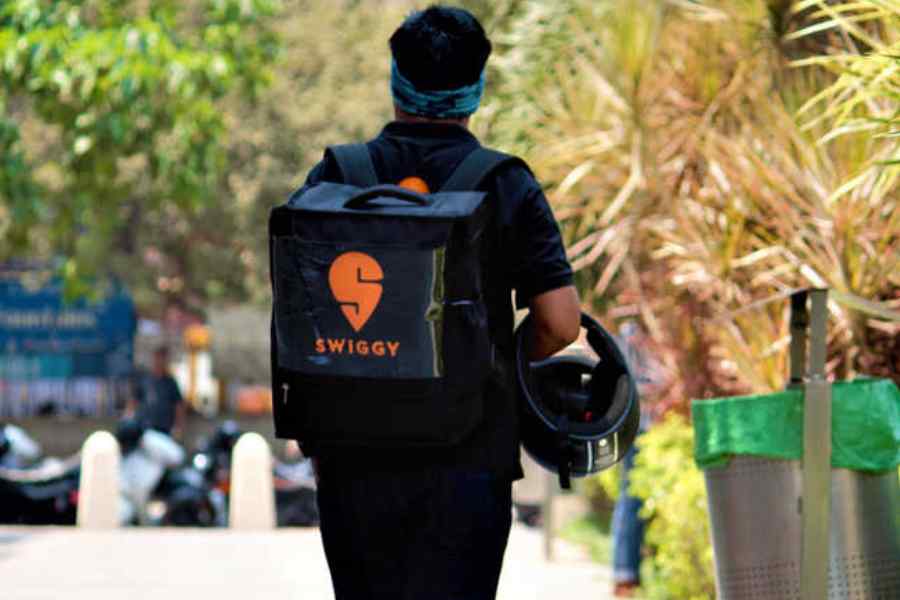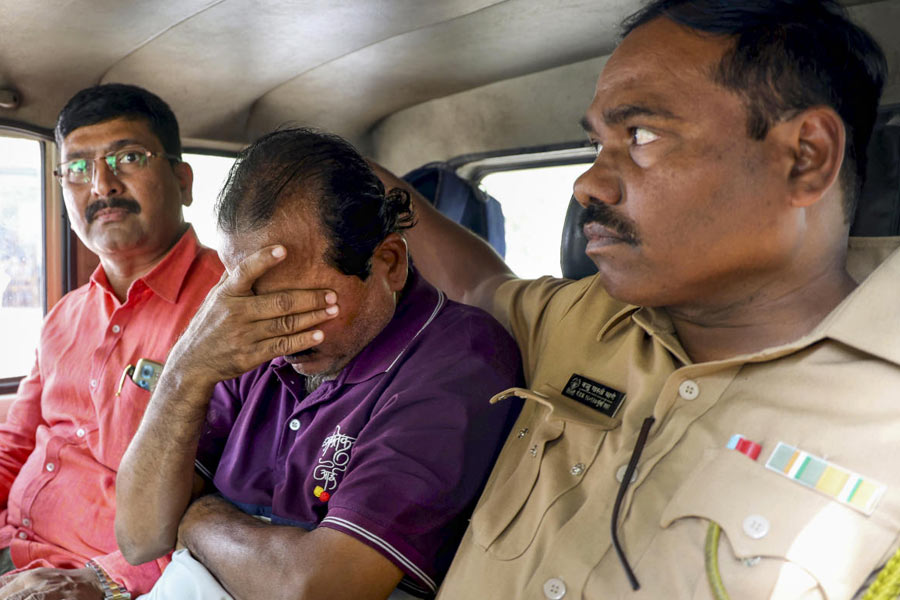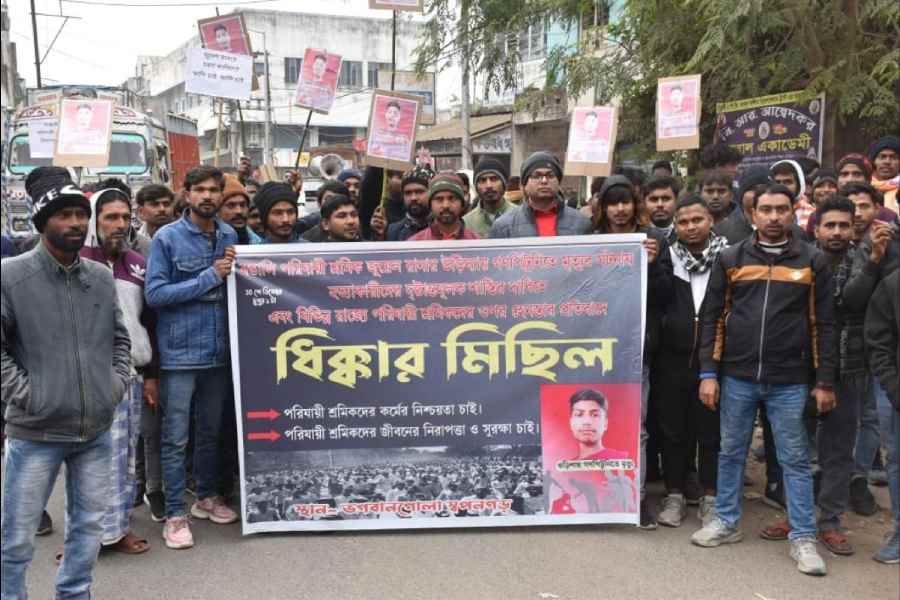 |
| Picture by UB Photos |
Bold, amiable and a man with a vision. This is Hiren Chandra Nath, the superintendent of police, Guwahati City, for you.
Fired by the challenge of ushering in an effective policing system, he mans 16 police stations, from Khetri to Azara. An IPS officer of the 1996 batch, Nath is a gold medallist from Gauhati University in Political Science. He has also done his Masters in police management from Osmania University, served as additional SP in Jorhat and Tezpur and was SP in Goalpara, Bongaigaon and Lakhimpur. He shares his views on the problems of policing in a fast-growing city.
Excerpts from the interview:
Q How do you rate your department’s endeavours in boosting police-public relations?
A We are trying to activate the nagarik committees, which work to bridge the gap between the police and the public, in all 60 wards of Guwahati. The co-operation of the public is crucial to our functions.
The nagarik committee in Islampur, especially some of the local youth, recently helped our department deal with illegal encroachment. In December, the committee in the Basistha area helped us arrest some dacoits. We try to interact with them through meetings and community feasts.
Working hand-in-hand with the people is a pleasure. As additional SP, Jorhat, I used to travel to every nook and corner of Majuli with a shovel and axe in my car. Only recently, I went to an inaccessible hillock in the Kharguli area of Guwahati in the evening. There was a big culvert and with practically no road ahead. I walked down the area and asked for an axe from the residents there. Initially, they were hesitant and suspicious but when they got to know my identity, more than 50 enthused people helped me and my PSOs build a bridge over a culvert within 45 minutes, something which they did not bother to do in the last many years.
Q What about the present law and order situation and the crime graph in the city? How does a change in season affect it?
A The crime graph has shown an increase from a total number of 4,300 recorded cases in 2001 to 5,165 in 2002 with the maximum cases being that of theft and burglary. In 2002, Panbazar division recorded 1,060 cases, Pandu 1,306 cases, Chandmari 981 cases and Dispur 1,818. Property offences like dacoity, robbery, housebreaking, vehicle thefts increase during winter, especially on the outskirts like Basistha and Fatasil. As the nights are long and visibility poor, it provides the miscreants with certain advantages like easy escape.
This is also the time when people take up construction work and, as a result, the floating population of the city, mainly the labourers, increases. On the other hand, miscreants target the built-up areas like shops and commercial establishments during the rainy season. Offences like pick-pocketing, vehicle theft, snatching are maximum in the festive season.
Q What is the most reported crime in the city?
A Property offences like theft and robbery are the most reported crimes in Guwahati. Land-grabbing is also increasing, especially in the newly-developed areas. As these cases are generally civil in nature and not cognisable offences, the police are often helpless.
Q Crime is commonly associated with men. What about the involvement of women in city crimes?
A Apart from some sensational cases, there have been only stray incidents involving women in crimes like swindling and fraud. Though there is no red light area as such, there are floating sex workers in the city. Most of the cases that we come across involve women from the economically lower section of society, especially housemaids. They indulge in such crimes for money.
Q What do you think of the police’s alleged role in illegal tax collection at checkgates?
A We maintain stringent checks and any police personnel found involved in any such activities will be brought to book. In my opinion, all checkgates should be stopped altogether and there should be other ways to collect revenue.
Q Any traffic management plans for the city?
A There are more than 3,600 roads and more than two lakh vehicles plying on the city streets. Of the 700 city buses, more than 300 ply on the same route. But the traffic strength is comparatively less with only 400 personnel, including homeguards. We have come down heavily on violators. Traffic depends on three Es — traffic engineering, education and enforcement. Unfortunately, we emphasise only on the enforcement, whereas traffic engineering and education is nil. We are also trying to implement a pre-paid taxi and auto services and electronic lighting in the city.
Q What is the status of the proposal for computerisation of crime data in city police stations?
A There is a Crime Criminal Information System (CCIS), which lists all cases of stolen vehicles. All FIRs lodged are computerised in the crime branch of the CID’s state crime record bureau, which is under the National Crime Records Bureau.
Q Has any step been taken to make the police force more gender-sensitive?
A We ask our staff to be sensitive to all people, including women. We are also planning to activate the Legal Advisory Board with representations from different sections of society.
Q Following the Barnali Das incident, there was an order to post private security guards at various bus terminals in the city. What is its status now? Was it just a gimmick to calm frayed nerves?
A It has not been very encouraging, but our department is maintaining strict vigil in all the sensitive areas with 80 Black Panther commandos in 35 Gypsy vehicles.
Q How has the proliferation of the private security services helped or hampered the services of the police force in the city?
A They are definitely helping us. But the system should be organised in a co-ordinated manner. The security agencies should appoint the boys after proper verification and monitor their activities at regular intervals.
Q What about the juvenile crime rate? Has there been step to educate the police force about child rights and how to deal with impressionable minds?
A There has been an alarming rise in the involvement of school and college students in vehicle theft, extortion, kidnapping, crimes against women and even bank robbery. Assam police has a programme called Aashwas, which takes care of children who have been victims of insurgency. Recently, we had a training of police personnel on the various issues regarding child rights at NIPCCD, Guwahati.
Q Do you support the proposal for the creation of a separate commissioner of police for the city?
A I would be a votary for it. The city SP has to command more than 6,000 personnel, which is almost the size of a brigade. A commissioner will have additional powers of a magistrate along with police power, which will help in effective planning and prompt execution.
Q How far has the implementation of the scheme for registration of tenants been successful in the city?
A It is difficult to keep a check on tenants in an unplanned city with a huge floating population. The response from the public has not been spontaneous. We are also computerising this data along with records of flats and public call offices under the supervision of an additional SP.
Q There are allegations of rampant corruption and bullying by police personnel.
A We are here to correct a corrupt society. I have suspended half-a-dozen policemen within three months of my joining here. I also appeal to the public to report such incidents to the police control room or use complaint boxes in front of police stations.
Interview by Teresa Rehman










